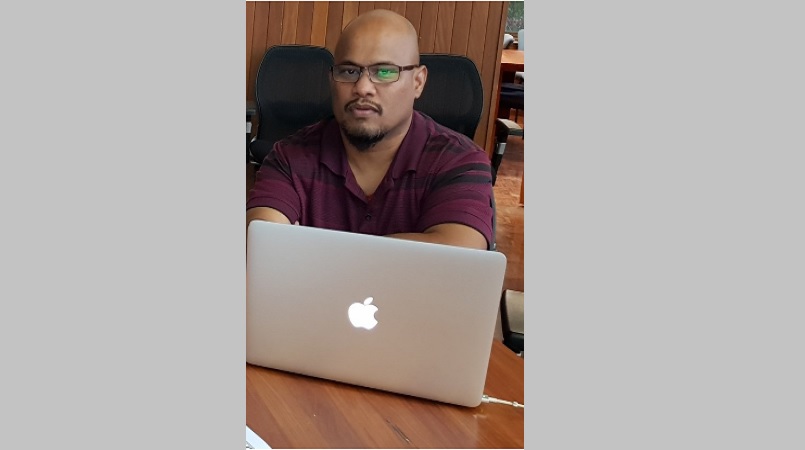
Regional fisheries observer trainer Elton Clodumar led a workshop updating qualified and experienced fisheries observers who are currently land-based due to COVID-19 restrictions, 30 June.
Participants are reviewing the latest paperwork, regulations and protocols in preparation for their return to work as coronavirus restrictions are relaxed and lifted around the world.
Speaking to the Nauru Bulletin, Mr Clodumar explained that Nauruan observers are deployed throughout the Pacific region and Nauru Fisheries and Marine Resources Authority (NFMRA) is the agent for local observers through the national program.
Fisheries observers are at the front line of protecting our fisheries.
“We are the eyes and the ears out there just to record anything we see and what happens,” Mr Clodumar said.
Fisheries observers collect accurate and unbiased information from commercial fishing vessels. This data may later be subject to scientific review or court interrogation. In many cases, the observer is the only person able to verify data supplied by fishers.
The focus of this workshop is to keep up to date with the required forms that change every two years in line with legal requirements coming from organisations like the Tuna Commission. As yet, fishing boats are not Wi-Fi enabled, so all observational recording is done with paper and pencil in a hard-copy workbook.
“A workbook would represent a trip. The main part of this is getting my guys collecting the right and the correct information. Accuracy is important for data uses. Most of the data goes back to Pacific Community (SPC). This is the science group of the Pacific. So, they analyse most of our information. If it’s a compliance issue, then it goes back to Forum Fisheries Agency (FFA).”
According to Mr Clodumar, there are 200 to 300 observers in the Pacific region at any one time, with purse-seine vessels at 100 per cent coverage, meaning that an observer is on board every ship, every time they go to sea. Since 2017, each program must ensure that observers have two-way communications, a flotation device, personal beacon
and an emergency action plan, but observers need to act with professionalism and commonsense to avoid being compromised.
The recent death in March this year of i-Kiribati fisheries observer Eritara Aati Kaierua, who died while on board a
Taiwanese flagged ship that had been fishing in Nauru waters, is one example.
“There’s only one observer per vessel. You have to be careful about how you record, where you record… it’s confidential stuff so I keep on updating my guys, you can’t just leave your information lying around anywhere, and don’t endanger yourself by taking photos of infringements right in front of everyone.”
“There’s only one observer per vessel. You have to be careful about how you record, where you record… it’s confidential stuff so I keep on updating my guys, you can’t just leave your information lying around anywhere, and don’t endanger yourself by taking photos of infringements right in front of everyone.”
Depending on the size of the vessel and other variables, fisheries observers can be at sea anywhere from a day to three months.
The role is not only observing infringements, violations and illegal, unreported and unregulated (IUU) fishing activity, but with training, can also include collecting samples for scientific research.
“We are given kits to store and collect certain samples from tuna species.
“The most common samples are the otoliths – the earbone of the fish, plus muscle tissue, gonads, stomach with the contents, liver, blood and tissue.”
The role offers opportunities for advancement, and SPC informs potential candidates.
“You could go on to become a debriefer, a trainer of observers, a port coordinator, a debriefing coordinator or even an observer manager. Many observers step sideways into other fisheries related jobs. Some have become fisheries compliance or enforcement officers, some have become senior fishery managers and others have used their income to fund further education or start their own business,” Mr Clodumar said.
The challenge is that the work is offered on a contract basis, trip by trip, so it is irregular, and in the situation now of global coronavirus pandemic and lockdowns, fisheries observers are forced to find alternative means to continue putting food on the table for their families.
In fact, improved job prospects and safety at sea for fishing observers was the key focus of the 114th Forum Fisheries
Committee meeting held in Honiara in late June.
The 17 members of the Pacific Islands Forum Fisheries Agency (FFA) discussed how the observer role can be made more sustainable, how the analytical skills of observers be better utilised by the industry and how to integrate online technology into the role.
In addition, members pushed for the development of minimum standards for observer insurance support to investigate observer safety issues, including providing information, technical and legal advice.
Finally, to get the industry online, FFA members committed to 100 per cent adoption of electronic reporting for fishing vessels operating within members’ Exclusive Economic Zones (EEZ) and the high seas by 2022.
To become an observer, talk to Nauru Fisheries and Marine Resources Authority (NFMRA). You can visit the Association for Professional Observers (APO) on Facebook: a non-profit, non-governmental organisation that strengthens observer programs through advocacy and education.
Photo Faceboook Caption: Elton Clodumar
